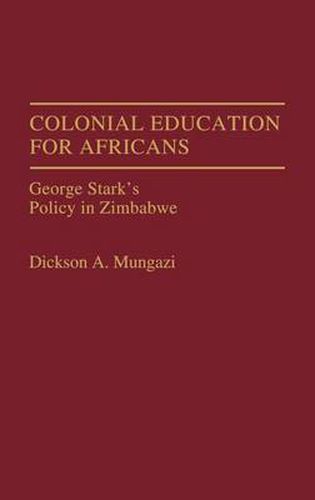Readings Newsletter
Become a Readings Member to make your shopping experience even easier.
Sign in or sign up for free!
You’re not far away from qualifying for FREE standard shipping within Australia
You’ve qualified for FREE standard shipping within Australia
The cart is loading…






Although colonialism has officially been terminated, it continues to affect populations who recent history has been shaped by European institutions, economic policies, and cultural biases. Focusing on British educational policy in colonial Zimbabwe, this historical study offers a unique perspective on the subject. It provides a detailed examination of a British educational programme for Africans established in the 1930s, the purposes it was intended to serve, and its long-term consequences. A policy of practical training and tribal conditioning was designed and implemented by George Stark, director of Native Education in colonial Zimbabwe from 1934 to 1954. Expressing the philosophy and goals of both stark and the British colonial government, its stated purposes were to develop a vast pool of cheap unskilled manual labour and to confine the African population to tribal settings. Dickson Mungazi discusses the policy as at once a reflection of traditional Victorian socio-cultural attitudes and the means to maintain a colonial status quo that allowed the profitable exploitation of the colony’s material and human resources. The author examines the consequent educational and economic disabilities suffered by the African population and the impact of their long exclusion from an effective role in the affairs of their country. This study is based on research utilizing extensive original materials from the period, including reports and official colonial government documents.
$9.00 standard shipping within Australia
FREE standard shipping within Australia for orders over $100.00
Express & International shipping calculated at checkout
Although colonialism has officially been terminated, it continues to affect populations who recent history has been shaped by European institutions, economic policies, and cultural biases. Focusing on British educational policy in colonial Zimbabwe, this historical study offers a unique perspective on the subject. It provides a detailed examination of a British educational programme for Africans established in the 1930s, the purposes it was intended to serve, and its long-term consequences. A policy of practical training and tribal conditioning was designed and implemented by George Stark, director of Native Education in colonial Zimbabwe from 1934 to 1954. Expressing the philosophy and goals of both stark and the British colonial government, its stated purposes were to develop a vast pool of cheap unskilled manual labour and to confine the African population to tribal settings. Dickson Mungazi discusses the policy as at once a reflection of traditional Victorian socio-cultural attitudes and the means to maintain a colonial status quo that allowed the profitable exploitation of the colony’s material and human resources. The author examines the consequent educational and economic disabilities suffered by the African population and the impact of their long exclusion from an effective role in the affairs of their country. This study is based on research utilizing extensive original materials from the period, including reports and official colonial government documents.